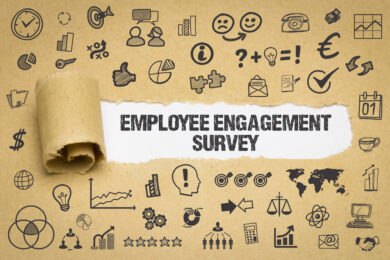Many of the forward-looking clients RMS works with are conducting employee engagement surveys to improve their current workplace culture and be proactive to the challenges they face in a quickly changing work environment. There is no denying that the workplace looks and feels fundamentally different than just a few years ago. Much of the work RMS conducts around employee satisfaction is to help clients unravel employee expectations and turn data into actionable insights for an improved workplace.
RMS knows that there are often barriers to getting an employee survey of the ground. But what can you expect to learn once your organization commits to doing an employee engagement study? The RMS team recently brainstormed some common themes across all our employee satisfaction work, and we developed a list of five areas you’ll likely learn more about. Our research shows that the five areas below (supervisors, DEI, connections, policy clarity, and pay) are critical to high employee satisfaction. So if you decide to do an employee satisfaction survey, you should be prepared to learn more about and act on the following areas.
1. Identify the Gaps in the Soft Skills of Your Supervisors
Many employees discuss the need to feel “valued” or “heard.” In our open-ended questions, we often learn that employees want to be recognized, feel valued, know their input matters, and that their manager recognizes their day-to-day work. In our quantitative questions, we often learn that supervisors are not always strongly fair in these areas. Think critically about the soft skills training you provide. Our data suggest that the supervisor is arguably the most important factor in employee satisfaction. Supervisors play a critical role in connecting an employee’s passion with purpose in the workplace. Ensuring that supervisors have the right toolkit and managerial skills to do so is essential.
2. Learn the Perception of Your Diversity, Inclusion, and Equity Policies and Programs
Time and again, we are hearing about the importance of DEI. Any DEI work done at your organization is critical to providing an inclusive workplace for all employees. However, some surveys suggest that this work is not always fully implemented or that more transparency is desired. If you are doing DEI work, be sure that there is a total commitment to the work and that practices are implemented. Otherwise, you risk making a critical DEI initiative look like it lacks authenticity.
3. Build Meaningful Connections at Your Workplace
The data primarily suggests that employees like the flexibility that has been commonplace. Most employees enjoy the ability to work from home. However, the data also indicates that something is lost in a fully remote setting and that employees want to build connections with other team members. For HR professionals, there is a need to work on identifying different ways to engage staff. Staff may have different opinions of what this looks like, and this information is critical as you plan and develop any engagement strategy.
4. Implement & Provide Clear Direction on Work from Home Policies
RMS employee engagement data suggest that staff are less concerned about who is working where or when but more about having clarity on the policy and whether the policy is implemented consistently. Be sure that with any procedure implemented, there is consistency and that people know the expectations and follow through on enforcement.
5. Assess Employee’s Satisfaction with Pay & Benefits
This always tends to be a sub-theme in our studies. If you can financially remove the stressor of staff feeling underpaid, satisfaction increases. RMS data suggest that people who think they are compensated fairly score other dimensions of satisfaction higher. These are difficult decisions, but clear communication on growth, pay, and expectations goes a long way toward increasing workplace satisfaction.
Consider diving deeper with an employee survey if any of these trends sound familiar for your organization. Our employee satisfaction surveys can help fine-tune engagement programs and policies. They also can highlight areas of strength and opportunities for improved workplace culture. Above all, employee engagement surveys can help contextualize an employee’s experience. Working with RMS, we can provide an authentic and reliable story about your employees’ workplace experience. This narrative then becomes the foundation for the improvement of your culture.
Don’t forget that employee surveys can take many shapes and sizes – and it’s important that however you decide to move forward, the results must be actionable and valuable to decision-makers and your entire workforce.
Relational RMS Blogs:
• How to Overcome Common Barriers to Employee Satisfaction Surveys
• Satisfaction Surveys for the Win
• 8 Benefits of Using an Employee Survey
It’s good to know. We’re here for you.
Call us today, to see how we can help your organization.
Interested in conducting a market research project with RMS?
Contact our Vice President of Corporate Development, Sandy Baker at SandyB@RMSresults.com or call 1-866-567-5422.
About RMS
Research & Marketing Strategies, Inc. (RMS) is a full-service market research firm in Central New York. Formed in 2002, RMS helps organizations that are looking to know more about their customers and/or potential customers. They conduct surveys, focus groups, mystery shopping, studies and analysis. Each project is customized and gets personal attention by the best in the business. RMS has a reputation for getting results and offers an independent means to conduct telephone, on-line and mail surveying, In-depth interviews, intercept interviews, and participant recruitment as well as focus group hosting through QualiSight, its onsite call center and focus group facility. Taking advantage of the region’s reputation for being a great market study barometer, RMS recruits and moderates for focus groups, community forums and town meetings.

